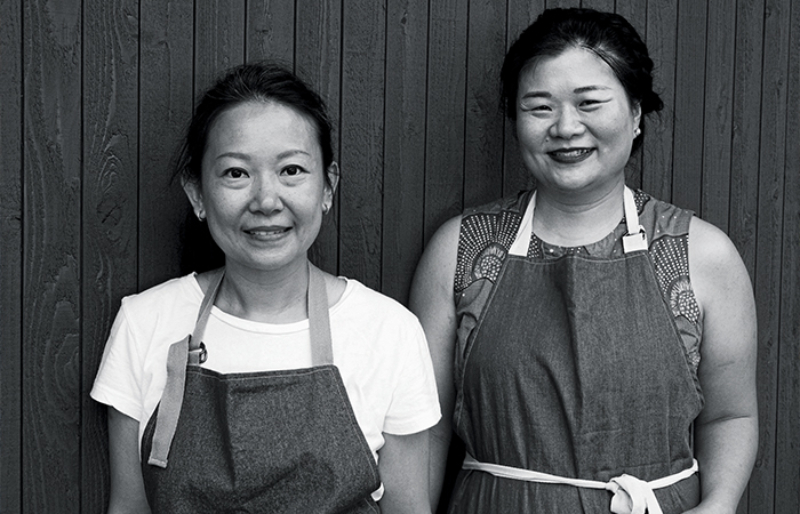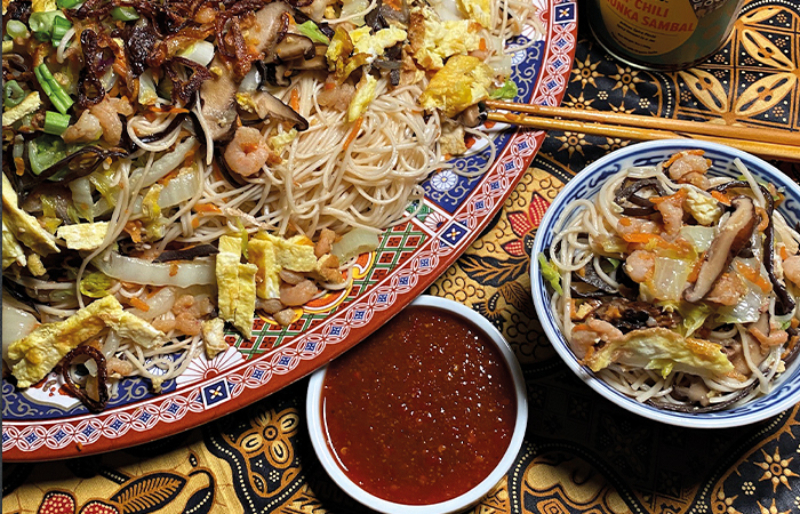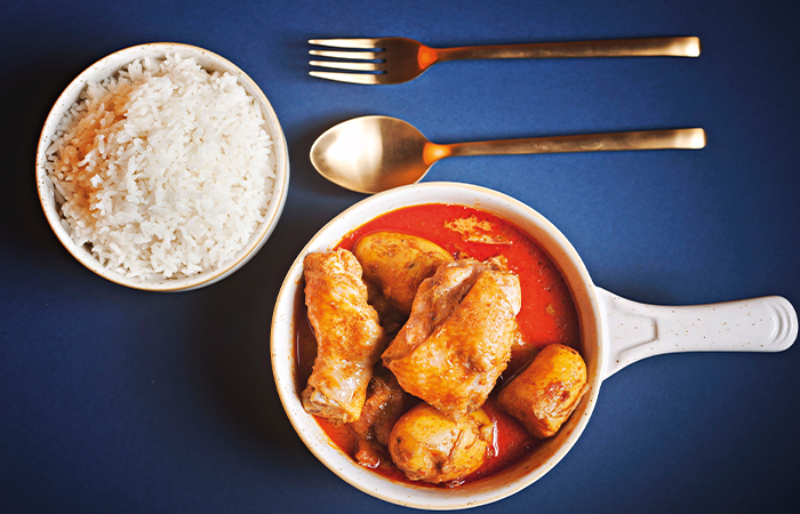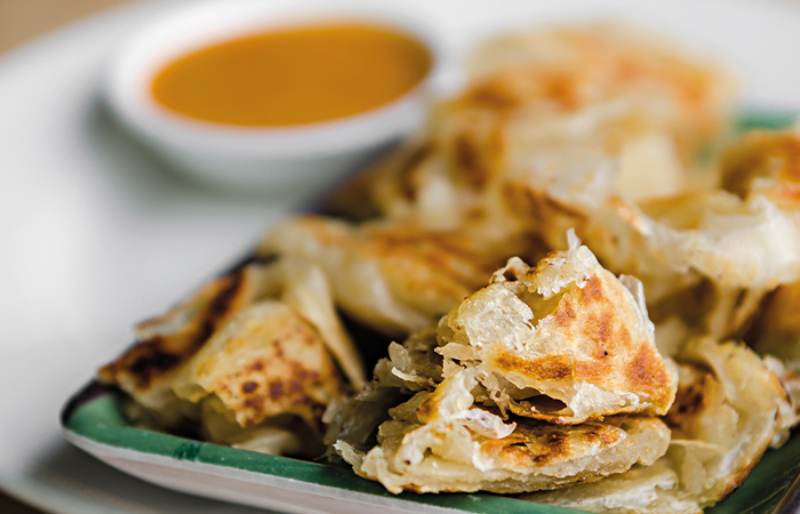Meet the pair selling Singapore sambal in the States

Portland, Oregon, in the Pacific Northwest is one of North America’s top foodie destinations and is known for its high quality and varied agricultural products.
It has more than 35,000 farms, of which over 90 per cent are family-owned and produce more than 200 food commodities. Many ingredients, such as onions, Dungeness crab and hazelnuts, are used in the culinary creations of Singaporean entrepreneurs Holly Ong and Pat Lau who founded their F&B enterprise Sibeiho, meaning “very good” in Hokkien, in Portland in 2018.
The two met as colleagues in 2006 at Nike’s Singapore office before being assigned to Nike Shanghai, and then to its Portland headquarters. During their time as expats, they would host dinners where they cooked elaborate Singaporean meals for their friends and colleagues.
“In most of the places where we travel to for work, we couldn’t find good Singaporean food. Singapore food is very nuanced, and non-Singaporeans are often unsure about the difference between our cuisine and others from South-east Asia, so we wanted to share the dishes we love with our friends,” Ong says.
The idea to turn their hobby into a business came as they drove along the gorgeous Oregon coast and sampled freshly caught Dungeness crabs. Lau says, “We looked at the crabs and thought, ‘why not make chilli crab for people who have never tried it?’ We felt chilli crab would allow us to introduce Singapore to people in Portland by marrying a well-loved local ingredient with our flavours.”
Sibeiho Supperclub, a private catering business, was born from this idea. Ong and Lau host dinners at their homes every month, where guests tuck into chilli crab and more.
“When I travelled to Europe for work, I often used aggregator website EatWith, where you could rock up to people’s homes for meal. Sometimes the host would be a chef, sometimes a home cook. You wouldn’t know who was coming, but everyone who came loved food and wanted to try new dishes and talk food with others. It was a wonderful communal experience, so we decided to start our Singapore version of something like that in Portland,” says Ong.

“For us, it was a guerilla marketing experience. We had a basic website and an Instagram account, and just posted a few dates every month and waited to see what the turnout would be like,” says Lau.
When their supper club launched in mid-2018, seats were quickly snapped up for all the dinners they held until the start of Covid-19 at the end of 2019.
When the pandemic struck and social dining was no longer viable, the duo shifted their business model to private catering and producing artisanal Sibeiho sambals, which became so popular that they are now Sibeiho’s signature offerings.
Ong and Lau initiallly considered selling kueh or chicken rice as a way to adapt to the pandemic, but they decided to focus instead on sambals to give Oregonians a way to create their own healthy meal at home with a taste of Singapore.

“We remembered the homecooked meals of our childhoods and in a lot of the dishes there was always sambal; it is such a versatile condiment. Sambal is the magic sauce in everything we cook, whether it’s a Chinese, Malay, Eurasian, or Indian dish. In Singapore, we are always eating sambal in one form or another—for example, there is the sweet sambal for nasi lemak, the chilli paste for char kway teow, and the coconut sambal that’s served with dosa,” says Ong.
Sibeiho’s Boomz Sambal, OMG! Sambal and AF Chili Chunka Sambal, which won 2022 Good Food Awards given to responsible craft food producers in America, are available via their website and at major Portland supermarkets.
“We make our sambals from locally sourced ingredients. They are low in sodium and sugar, and do not contain MSG. Many of our customers are surprised at how healthy they are,” Lau says.
According to Ong, many Oregonians are into eco-conscious, sustainable eating. “They are very particular about the origin of their foods. Most of Sibeiho’s ingredients come from small local businesses that practise environmentally friendly, ethical farming. “We only have one planet, so it’s important that we don’t just consume mindlessly. We keep this in mind when we prepare our sambals.”
[[nid:575117]]
Sibeiho opened its commercial kitchen and retail space in November 2020 on NW 23rd Ave in Northwest Portland, a vibrant, eclectic neighbourhood full of unique shops and eateries.
The delicious sambals and seasonal specialities such as kaya are highlights of the shop, where guests chat with Ong and Lau and buy porcelain ware from Supermama, and even cookbooks from Epigram.
“Rather than a restaurant, we are a hybrid space that does private catering and produces high quality, artisanal products. Many Americans associate Asian food with unhealthy, MSG-laden Chinese takeout. People will spend US$15 (S$21) for a jar of artisanal Italian pesto, but Asian condiments are perceived as cheap and of inferior quality.
“A proper Singaporean home- cooked meal with at least three meat or vegetable dishes and one slow-boiled soup takes more effort than preparing a Western steak and potato dinner. Our brand provides Americans with the opportunity to learn more about the flavours, history, and culture of our cuisine,” says Ong.
“We may be far from home, but we want to represent our little red dot in a way that will make our family, friends and country proud.”
Sibeiho isn’t the only Singaporean-owned F&B business promoting our cuisine. Here are a few more.

Singaporean Eurasian Amy Pryke launched Native Noodles at the Queens Night Market in 2019, before opening her first casual counter-service restaurant in February 2021. She started off selling laksa, but has now expanded her menu to include familiar favourites like wonton mee and roti john.
“Many of our customers are trying Singaporean food for the first time through Native Noodles before becoming regulars. I believe the representation of Singapore in Hollywood movies and Netflix shows has helped put Singapore on the radar of more New Yorkers,” says Pryke.

Rasa Sayang opened in London’s Chinatown in 2008.
“At the time, Chinatown was dominated by dim sum and roast duck restaurants,” says founder Ellen Chew. “Although they were good restaurants, there was a lack of choice for diners, so I decided that a Singaporean and Malaysian restaurant would be a great addition to the neighbourhood and to London. Since we launched, the British have become more open to trying new cuisines, and Singaporean food offers them dynamic and exciting and flavourful dishes. What’s more, as we are a Halal restaurant, we also have many Muslim regulars.”

Shiok Kitchen began as a small 16-seat hole-in-the-wall eatery on Laurel Street in San Carlos during the height of the Silicon Valley boom in 1999. Since then, it has moved to Menlo Park, a city in San Mateo County in the San Francisco Bay Area, and has expanded its menu to include items like roti prata, Hokkien mee, hor fun, and beef rendang.
“Now is an exciting time for Singaporean cuisine in the US. Thanks to the Food Network shows featuring Singaporean food, and Crazy Rich Asians, more people in the US want to try our cuisine,” says Dennis Lim, owner of the restaurant.
This article was first published in The Peak.